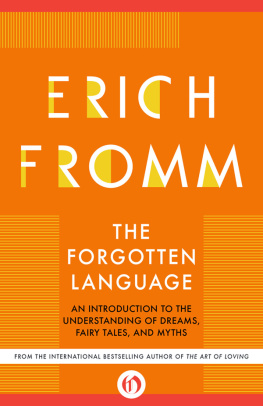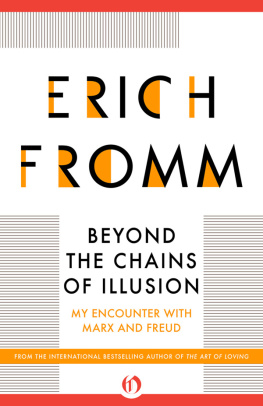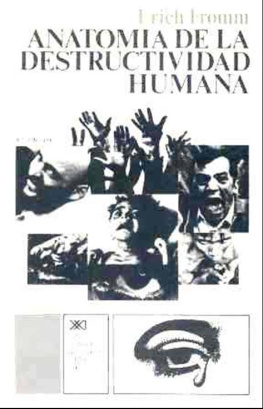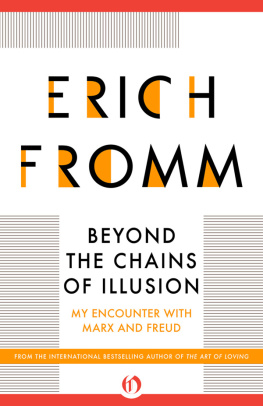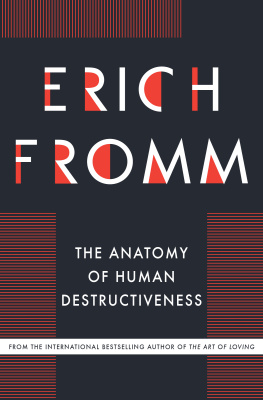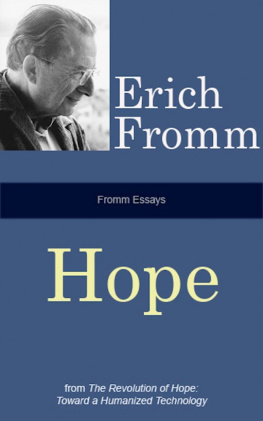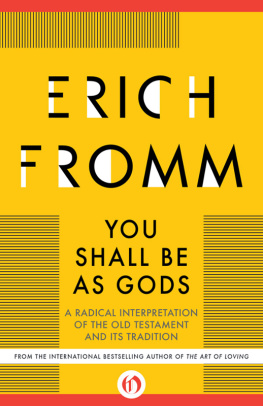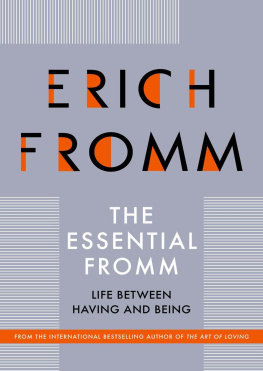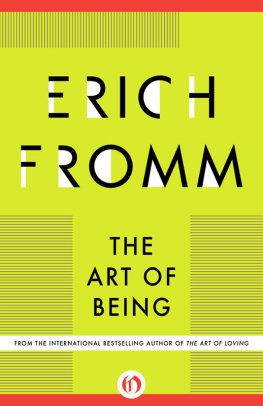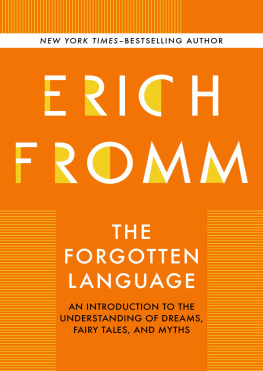
The Forgotten Language
An Introduction to the Understanding of Dreams, Fairy Tales, and Myths
Erich Fromm

Foreword
This book is based on lectures which I gave, as an introductory course, to the postgraduate students in training at the William A. White Institute of Psychiatry and to undergraduate students at Bennington College. It is addressed to a similar audience, to the student of psychiatry and psychology and to the interested layman. As the subtitle indicates, this book is an introduction into the understanding of symbolic language; for this reason it does not deal with many of the more complicated problems in this field, the discussion of which would have been incompatible with the purpose of an introduction. I have thus, for instance, discussed Freuds theory only on the level of his Interpretation of Dreams and not in the light of the more difficult concepts he developed in his later writings; nor have I attempted to discuss those aspects of symbolic language which, although necessary for the full understanding of the problems involved, presuppose the more general information which these pages try to convey. I intend to deal with these problems in a second volume later on.
The term, an introduction to the understanding of dreams, etc., was chosen intentionally instead of using the more conventional term interpretation. If, as I shall try to show in the following pages, symbolic language is a language in its own right, in fact, the only universal language the human race ever developed, then the problem is indeed one of understanding it rather than of interpreting as if one dealt with an artificially manufactured secret code. I believe that such understanding is important for every person who wants to be in touch with himself, and not only for the psychotherapist who wants to cure mental disturbances; hence I believe that the understanding of symbolic language should be taught in our high schools and colleges just as other foreign languages are part of their curriculum. One of the aims of this book is to contribute to the realization of this idea.
I am indebted to Dr. Edward S. Tauber for reading the manuscript and for his constructive criticisms and suggestions.
I wish to thank Dr. Ruth N. Anshen, editor of The Family, Its Function and Destiny, and Harper Brothers for permission to make use, in the present volume, of my article The Oedipus Myth and the Oedipus Complex. Furthermore, I wish to thank the following publishers for the privilege of using extensive passages from their publications: Random House, New York, excerpts from the Modern Library Edition of Plato, The Republic, trans. by B. Jowett, Oedipus at Colonus and Antigone trans. by R. C. Jebb from The Complete Greek Drama, The Basic Writings of Sigmund Freud, trans. and edited by A. A. Brill, and excerpts from Ralph L. Woods The World of Dream; Allen & Unwin, London, for excerpts from The Interpretation of Dream by Sigmund Freud; Burns, Oates & Washbourne, Ltd., London, and Benziger Brothers New York, for an excerpt from Summa Theologica by Thomas Aquinas, translated by the Fathers of the English Dominican Province; The Macmillan Company, New York, excerpt from Kant, The Dreams of a Spirit Seer, trans. by E. F. Goerwitz; Houghton Mifflin Company, Boston, excerpts from Ralph Waldo Emerson, Lectures and Biographical Sketches; Classics Club, W. J. Black, New York, excerpts from Plato, Phaedo, trans. by B. Jowett; Oxford Clarendon Press, excerpts from The Works of Aristotle, trans. under the editorship of W. D. Ross; Harvard University Press, Cambridge, excerpts from Lucretius, De Rerum Natura, trans. by W. H. D. Rouse; Yale University Press, New Haven, excerpts from C. J. Jung, Psychology and Religion; B. W. Huebsch, excerpts from Henri Bergson, Dreams, trans. by E. E. Slosson; Alfred A. Knopf, New York, excerpts from The Trial by Franz Kafka, trans. by E. I. Muir.
Erich Fromm
1951
A dream which is not understood is like a letter which is not opened.
Talmud
Sleep takes off the costume of circumstance, arms us, with terrible freedom, so that every will rushes to a deed. A skillful man reads his dreams for his self-knowledge; yet not the details but the quality.
Emerson
I Introduction
If it is true that the ability to be puzzled is the beginning of wisdom, then this truth is a sad commentary on the wisdom of modern man. Whatever the merits of our high degree of literary and universal education, we have lost the gift for being puzzled. Everything is supposed to be knownif not to ourselves then to some specialist whose business it is to know what we do not know. In fact, to be puzzled is embarrassing, a sign of intellectual inferiority. Even children are rarely surprised, or at least they try not to show that they are; and as we grow older we gradually lose the ability to be surprised. To have the right answers seems all-important; to ask the right questions is considered insignificant by comparison.
This attitude is perhaps one reason why one of the most puzzling phenomena in our lives, our dreams, gives so little cause for wonder and for raising questions. We all dream; we do not understand our dreams, yet we act as if nothing strange goes on in our sleep minds, strange at least by comparison with the logical purposeful doings of our minds when we are awake.
When we are awake, we are active, rational beings, eager to make an effort to get what we want and prepared to defend ourselves against attack. We act and we observe; we see things outside, perhaps not as they are, but at least in such a manner that we can use and manipulate them. But we are also rather unimaginative, and rarelyexcept as children or if we are poetsdoes our imagination go beyond duplicating the stories and plots that are part of our actual experience. We are effective but somewhat dull. We call the field of our daytime observation reality and are proud of our realism and our cleverness in manipulating it.
When we are asleep, we awake to another form of existence. We dream. We invent stories which never happened and sometimes for which there is not even any precedent in reality. Sometimes we are the hero, sometimes the villain; sometimes we see the most beautiful scenes and are happy; often we are thrown into extreme terror. But whatever the role we play in the dream we are the author, it is our dream, we have invented the plot.
Most of our dreams have one characteristic in common: they do not follow the laws of logic that govern our waking thought. The categories of space and time are neglected. People who are dead, we see alive; events which we watch in the present, occurred many years ago. We dream of two events as occurring simultaneously when in reality they could not possibly occur at the same time. We pay just as little attention to the laws of space. It is simple for us to move to a distant place in an instant, to be in two places at once, to fuse two persons into one, or to have one person suddenly be changed into another. Indeed, in our dreams we are the creators of a world where time and space, which limit all the activities of our body, have no power.
Another odd thing about our dreams is that we think of events and persons we have not thought of for years, and whom, in the waking state, we would never have remembered. Suddenly they appear in the dream as acquaintances whom we had thought of many times. In our sleeping life, we seem to tap the vast store of experience and memory which in the daytime we do not know exists.
Next page
